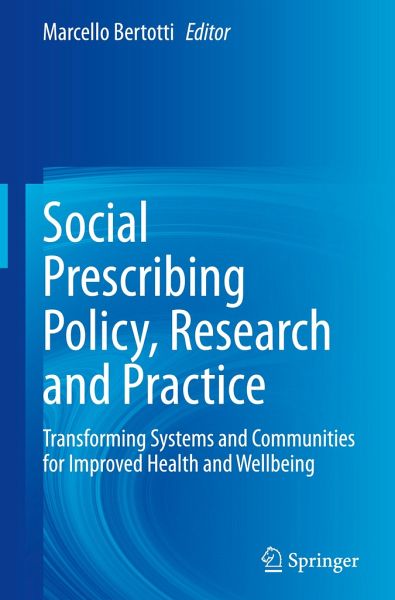
Social Prescribing Policy, Research and Practice
Transforming Systems and Communities for Improved Health and Wellbeing
Herausgegeben: Bertotti, Marcello

PAYBACK Punkte
35 °P sammeln!
This contributed volume uniquely enhances our knowledge and understanding of social prescribing internationally. It fills a gap in the literature by engaging critically with the concept of social prescribing across different countries, to contribute to more general lessons that can be used in a variety of contexts.The book discusses the strengths and weaknesses in the design, implementation, evaluation, policy, and practice of social prescribing. Each chapter has a framework structured around three key themes: the key policies underpinning social prescribing, the evaluation and research eviden...
This contributed volume uniquely enhances our knowledge and understanding of social prescribing internationally. It fills a gap in the literature by engaging critically with the concept of social prescribing across different countries, to contribute to more general lessons that can be used in a variety of contexts.
The book discusses the strengths and weaknesses in the design, implementation, evaluation, policy, and practice of social prescribing. Each chapter has a framework structured around three key themes: the key policies underpinning social prescribing, the evaluation and research evidence base, and practice including the design and implementation of social prescribing. Country-based chapters focus on the development of social prescribing and include case studies of different social prescribing models in England, Wales, Portugal, Germany, Republic of Ireland, Canada and Singapore. Three chapters are dedicated to England given the wide-ranging contribution of this country to the development of social prescribing. Among the topics covered:An international perspective on social prescribing: introductionThe role of social prescribing in addressing health inequalitiesImplementing social prescribing schemesConclusion: The present and future of social prescribingSocial Prescribing Policy, Research and Practice: Transforming Systems and Communities for Improved Health and Wellbeing encapsulates the wide-ranging evidence on social prescribing in a single volume. The book should appeal to a broad and diverse audience including researchers interested in the evaluation and effective design and implementation of social prescribing and community health intervention more generally; researchers and commissioners of public health interventions; healthcare professionals involved in the development of health interventions in primary, secondary and tertiary care; the local health economy which includes local government departments (e.g., public health, housing, employment, social services); professionals working in the Voluntary, Community and Social Enterprise (VCSE) sector; policy makers; and university students (including medical students).
The book discusses the strengths and weaknesses in the design, implementation, evaluation, policy, and practice of social prescribing. Each chapter has a framework structured around three key themes: the key policies underpinning social prescribing, the evaluation and research evidence base, and practice including the design and implementation of social prescribing. Country-based chapters focus on the development of social prescribing and include case studies of different social prescribing models in England, Wales, Portugal, Germany, Republic of Ireland, Canada and Singapore. Three chapters are dedicated to England given the wide-ranging contribution of this country to the development of social prescribing. Among the topics covered:An international perspective on social prescribing: introductionThe role of social prescribing in addressing health inequalitiesImplementing social prescribing schemesConclusion: The present and future of social prescribingSocial Prescribing Policy, Research and Practice: Transforming Systems and Communities for Improved Health and Wellbeing encapsulates the wide-ranging evidence on social prescribing in a single volume. The book should appeal to a broad and diverse audience including researchers interested in the evaluation and effective design and implementation of social prescribing and community health intervention more generally; researchers and commissioners of public health interventions; healthcare professionals involved in the development of health interventions in primary, secondary and tertiary care; the local health economy which includes local government departments (e.g., public health, housing, employment, social services); professionals working in the Voluntary, Community and Social Enterprise (VCSE) sector; policy makers; and university students (including medical students).












